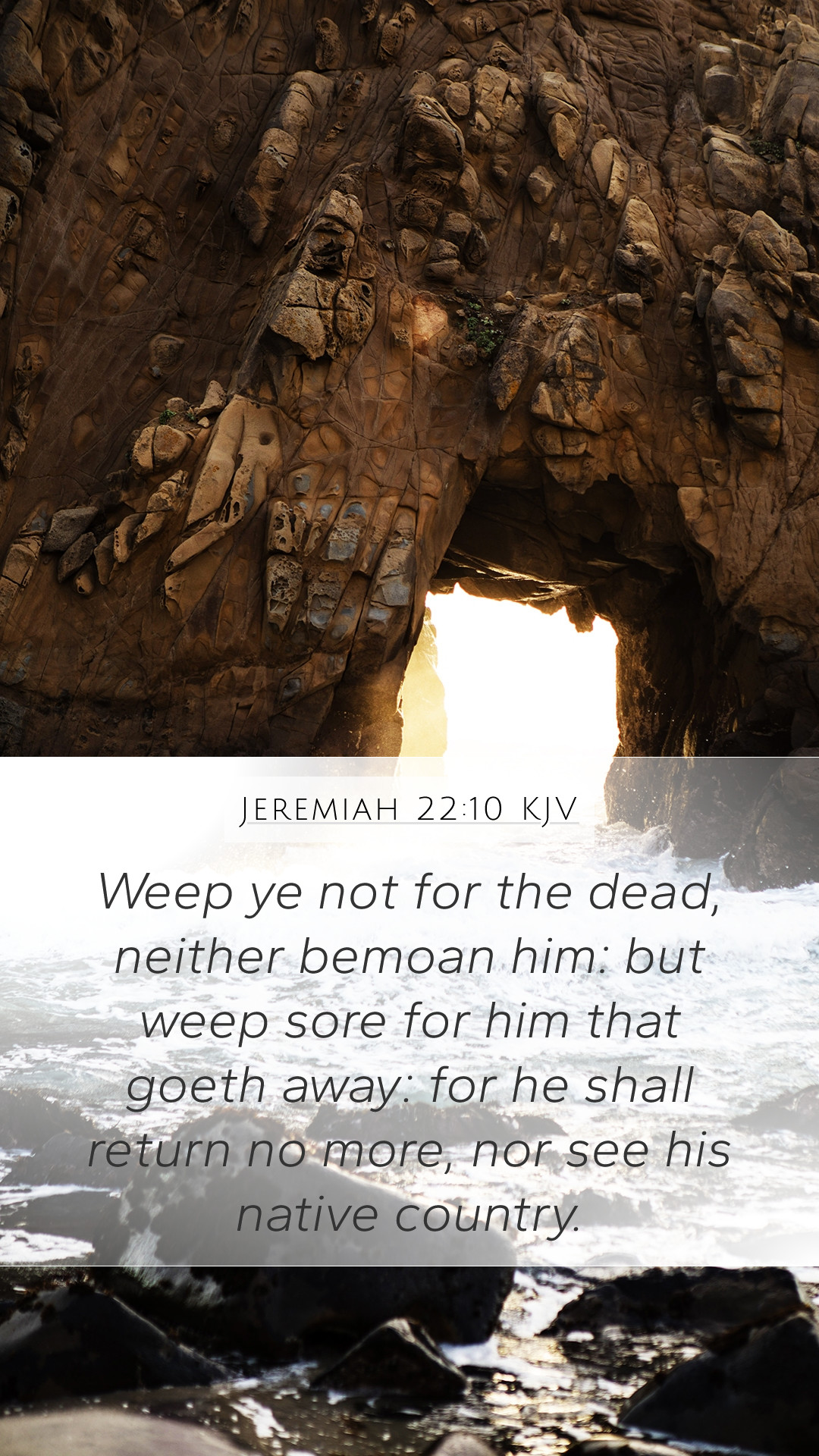Understanding Jeremiah 22:10
The verse Jeremiah 22:10 states: "Weep not for the dead, neither bemoan him: but weep sore for him that goeth away: for he shall return no more, and see his native country." This verse emphasizes the importance of lamenting not for those who die but rather for those who are taken away from their homeland, underscoring themes of exile, loss, and national sorrow. Below, we explore the insights provided by various public domain commentaries for a deeper understanding of this scripture.
Insights from Commentaries
-
Matthew Henry's Commentary:
Matthew Henry notes that the verse conveys a message about the fate of King Jehoiakim, whose death is anticipated. The surrounding context highlights that while physical death is tragic, the removal of one from their homeland is portrayed as a greater tragedy due to the associated loss of identity and heritage. Henry emphasizes that this reflects God's judgment and the erasure of the king's legacy, reinforcing that the wellbeing of a nation is often linked to its leaders.
-
Albert Barnes' Notes:
Albert Barnes discusses the sociopolitical implications behind the mourning described in the verse. He suggests that the emphasis on weeping for those taken away serves as a poignant reminder of the exile faced by the Israelites, connecting the text to the broader narrative of Babylonian captivity. Barnes sheds light on how this verse serves as a call to understand the communal grief that comes from loss of country and freedom, rather than solely focusing on individual death.
-
Adam Clarke's Commentary:
Adam Clarke interprets this passage by presenting it within the context of Hebrew mourning practices. He explains that mourning for the dead involved a ritualistic approach that typically emphasized communal participation. Clarke underlines that Jeremiah’s call to lament for those taken away speaks to the emotional bonds that bind individuals to their nation, reinforcing the idea that national identity is mourned deeply when one is exiled.
Key Themes and Interpretations
This verse touches upon several key themes in Biblical understanding:
-
Exile and Loss:
The most immediate theme is the sorrow linked to exile. Throughout Scripture, loss of homeland signifies a deeper spiritual and cultural estrangement from God.
-
Judgment and Consequences:
Jeremiah repeatedly notes that this mourning reflects divine judgment. The exiles of Israel serve as a warning and a call to repentance for future generations.
-
Community Grief:
The verse advocates for communal grief over individual suffering, illustrating the necessity of collective identity and mourning within the faith community.
Application for Modern Believers
For contemporary readers, Jeremiah 22:10 invites reflection on several levels:
-
Understanding Loss:
Reflecting on personal and communal losses enables deeper empathy and acknowledgment of shared burdens.
-
Engaging with Heritage:
Recognizing the historical and spiritual significance of one’s homeland can foster a stronger connection to God’s promises and identity.
-
Promoting Unity:
This passage encourages believers to unite in their grieving processes, particularly regarding issues of social justice and national identity.
Cross References
To deepen the understanding of Jeremiah 22:10, consider the following cross-references:
- Jeremiah 9:17-19 - Discusses the mourning rituals connected to the death of a loved one and national distress.
- 2 Kings 24:14 - Details the exile of the Israelites to Babylon, illustrating the loss of homeland.
- Ezekiel 12:10 - Proclaims the impending doom of those in exile and reinforces the idea of national judgment.
Conclusion
In summary, Jeremiah 22:10 serves as a profound reflection on mourning, identity, and the impact of divine judgment. The insights from public domain commentaries enrich our understanding of this verse, making it relevant for today's discussions on loss and community. Understanding Scripture in this way can facilitate deeper Bible study insights for groups and individuals alike.
By engaging with the meaning of Bible verses like Jeremiah 22:10, believers can find guidance and comfort in their spiritual journeys, relating ancient texts to modern life while promoting unity and empathy within their communities.


